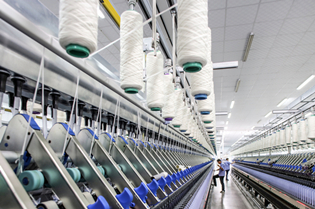Company Special: Nestle inaugurates first dairy farming institute in China
Switzerland-headquartered dairy giant Nestle inaugurated its world's first dairy farming institute in Shuangcheng, Heilongjiang province, on Oct 15.
The institute is one of the company's biggest-ever dairy investments and part of Nestle's long-term effort to share technical knowledge to improve dairy farming around the world through training, responsible practices and partnering with stakeholders including governments and universities.
The institute aims to help modernize Chinese dairy practices so farmers can meet the country's fast-growing milk demand in a sustainable way.
"We have a history of developing milk districts and the Nestle Dairy Farming Institute is an extension of that," John Cheung, Nestle China chairman and chief executive, said at the opening ceremony for the facility.
Cheung said the institute follows the principle of "open-up and all-win" and will be open to any dairy farmer in China who wants professional training.
"I hope the establishment of the institute will not only train technical and management professionals, but also promote dairy farming to reach widespread modernization and standards," he said.
The institute covers 600,000 square meters and includes classrooms, laboratories, dormitories and three farms to facilitate training courses.
"It offers different-level courses including fundamentals in breeding, nutrition and even professional training in management and finance to meet the needs of different levels of dairy professionals," said Christian Schmid, technical head of Nestle, "The duration of the courses range from several days to several weeks."
The institute is expected to train around 700 students annually with 17 different course offerings, said Schmid.
The Dairy Farming Institute has established cooperative relationships with 15 partners including Alltech, Alta Genetics, Avery, Boehringer Ingelheim, Eastrock, Elanco, Foester Technik, GEA, Goke��Storty, IFCN, Land O' Lakes, SCR and Zoetis as well as academic partners at the University of Wisconsin Madison and Northeast Agricultural University in Heilongjiang province.
Projects
The institute reflects Nestle's belief that for a company to be successful over the long term and create value for shareholders, it must create value for society, according to Cheung.
With dairy operations in China for more than 25 years, Nestle already has milk districts in Shuangcheng, Laixi in Qingdao and Hulunbuir in Inner Mongolia.
"The three districts can provide 600,000 tons of fresh milk a year, two-thirds of Nestle's requirements," said Lu Ming, Nestle's head of milk sourcing.
China is one of the fastest-growing markets for milk products globally, and that market could almost double in volume by 2020.
"Milk is becoming a vital part of the Chinese diet, so the institute represents our commitment to helping China move its dairy sector to the next stage of development in a sustainable and efficient manner," said Hans Joehr, Nestle's head of agriculture.
The principles and practices for sustainable dairy farming will serve as a basis for the institute's curriculum and training in addition to the expertise of Nestle and its partners.
The principles and practices are aimed at responsible production of safe, quality-assured dairy products.
"You can't get high-quality raw materials for food products in a destroyed environment," said Joerh, "We clearly see the relationship between a healthy environment, healthy food and healthy citizens - and this is why we promote sustainable agriculture worldwide.
"As a food company, we strongly believe that we have the responsibility to produce high-quality raw materials in a healthy environment," said Joerh.
The institute's courses cover a wide range of dairy management disciplines including animal health and welfare, milking hygiene, animal nutrition, environmental protection and socioeconomic management.
The institute provides a new model of dairy training in China. In the morning, farmers go to the classroom and in the afternoon, they work with cows.
"We want to offer young talented people an opportunity for professional training so they get to know the business model," said Joehr.
From Oct 16 to 18, the first class of 26 students was given a three-day course on animal feeding.
Some of the students from Heilongjiang, Shandong province and Inner Mongolia autonomous region are dairy farmers who want to improve and some want to learn how to train others.
"The three-day course discusses and demonstrates how to provide a consistent, high quality diet to dairy cows," said Dave Combs, a professor from the University of Wisconsin Madison, the first lecturer in the training.
"We teach concepts, demonstrate some basic skills that feeders need and challenge them to apply these concepts and skills to their dairy farms," Combs told his students. "It is expected that after the course you are able to accurately prepare total mixed rations. You are able to monitor feed intake and evaluate feeding behavior and the health of cows. You are able to communicate with others about the health, well-being and productivity of cows under your care."
Wu Zhong, a dairy farmer in Shuangcheng for more than 20 years, had only 10 cows before 2004 and now has more than 200.
"With the rapid growth of my farm, I deeply realized the existing problems in feeding compared with the international advanced level, so when I got the news of the training, I registered at once.
"I enjoyed great benefits from the lecture, which brought me advanced technology and ideas, which can help me promote my farm greatly," said Wu.
zhouhuiying@chinadaily.com.cn



 Print
Print Mail
Mail





